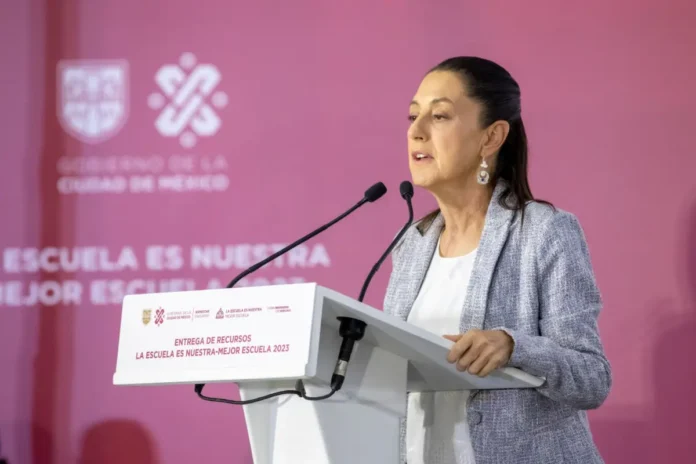Claudia Sheinbaum, a climate scientist and former mayor of Mexico City, has achieved a groundbreaking milestone by becoming the first female president of Mexico. Her historic win in the presidential polls marks a significant moment in the country’s political landscape.
Expanding upon the support garnered by her mentor and the current president, Andres Manuel Lopez Obrador, among the impoverished segments of the population, Sheinbaum successfully obtained a vote share ranging from 58.3% to 60.7%, as indicated by a swift sample count conducted by Mexico’s electoral authority. This vote percentage represents the highest ever recorded in Mexico’s history of democratic elections.
Opposition candidate Xochitl Galvez has accepted her loss following the release of initial results, which indicate that she received a vote share ranging from 26.6% to 28.6%.
Additionally, the governing coalition was also poised to achieve a potential two-thirds super majority in both chambers of Congress, enabling them to enact constitutional reforms without the need for support from the opposition, as indicated by the various outcomes provided by the electoral authority.
Sheinbaum excitedly announced to her supporters, amidst enthusiastic cheers of “president, president,” that she would be making history as the first female president of Mexico in the 200 years since the republic’s establishment.
The triumph achieved by Sheinbaum marks a significant milestone for Mexico, a nation renowned for having the second-largest community of Roman Catholics globally. Throughout the years, Mexico has upheld more conservative ideals and gender roles for women.
Nevertheless, Sheinbaum has made history as the first female candidate to secure victory in a general election across the United States, Mexico, and Canada.

“I never imagined that one day I would vote for a woman,” said 87-year-old Edelmira Montiel, a Sheinbaum supporter in Mexico’s smallest state Tlaxcala.
“Before we couldn’t even vote, and when you could, it was to vote for the person your husband told you to vote for. Thank God that has changed and I get to live it,” Montiel added.
The first female president of the country faces a challenging road ahead as she navigates the task of fulfilling her pledges to enhance social welfare programs, all while dealing with a significant budget shortfall and sluggish economic growth.
After the initial election results were made public, she assured her supporters that her administration would prioritize fiscal responsibility and uphold the independence of the central bank.
She has made a commitment to enhance security, but has provided limited information. The recent election, which witnessed the highest levels of violence in Mexico’s modern history with the assassination of 38 candidates, has further highlighted the extensive security challenges. Numerous experts argue that organized crime syndicates have expanded and strengthened their control during Obrador’s tenure.
The recent election on Sunday was also tainted by the unfortunate deaths of two individuals at polling stations in Puebla state. It is worth noting that the number of fatalities during Obrador’s term has surpassed 185,000, making it the highest recorded under any administration in Mexico’s modern history. It is important to mention, however, that the homicide rate has been gradually decreasing.
According to Nathaniel Parish Flannery, an independent political risk analyst focused on Latin America, unless Sheinbaum dedicates herself to a substantial investment in enhancing law enforcement and decreasing impunity, it is probable that she will face challenges in achieving a substantial enhancement in the overall security levels.
According to initial results, the MORENA party emerged victorious in the race for the position of Mexico City mayor, which is considered one of the most significant roles in the country.
“What’s Next?”
Apart from managing the dealings with the neighboring United States regarding concerns related to migrants and drug smuggling, the president will also be confronted with various internal challenges. These include addressing the scarcity of electricity and water, as well as enticing manufacturers to relocate as part of the growing trend of nearshoring. Nearshoring involves companies moving their supply chains closer to their primary markets.
Sheinbaum will face the challenge of determining the course of action for Pemex, the national oil company that has experienced a decrease in production over the past twenty years and is burdened with a substantial amount of debt.
Alberto Ramos, the chief Latin America economist at Goldman Sachs, emphasized the need for a reevaluation of Pemex’s business model. He expressed concern about the continuous injection of public funds into the company without achieving profitability. Ramos highlighted the necessity to address this issue and find a more sustainable approach for Pemex’s operations.
Obrador implemented a twofold increase in the minimum wage, resulting in a reduction in poverty rates. Additionally, he oversaw the strengthening of the peso and maintained low levels of unemployment. These achievements greatly contributed to his immense popularity.
Sheinbaum has made a commitment to enhance social assistance initiatives, but this task will prove challenging due to Mexico’s projected significant deficit for this year and the anticipated sluggish GDP growth of only 1.5% according to the central bank’s forecast for 2025.
The presence of Obrador has been prominent throughout the campaign, aiming to transform the election into a verdict on his political plans. Sheinbaum has dismissed allegations from the opposition that she would merely be a figurehead for Obrador, although she has promised to carry on with several of his initiatives, particularly those that have benefited Mexico’s most disadvantaged citizens.
During her triumphant address, Sheinbaum expressed her gratitude to Obrador, acknowledging him as an exceptional individual who has brought about significant positive changes to our nation.
Political analyst Viri Rios suggested that the criticism of Sheinbaum being perceived as a puppet of the previous leader stemmed from sexism.
“It’s astonishing that individuals find it hard to accept that she will be exercising her own choices, and I believe this is largely influenced by the fact that she is a woman,” she expressed.


